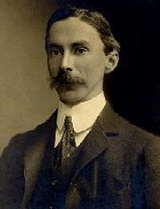
, mathematician
, historian
, and social critic. At various points in his life he considered himself a liberal
, a socialist, and a pacifist, but he also admitted that he had never been any of these things in any profound sense. He was born in Monmouthshire, into one of the most prominent aristocratic families in Britain.
Russell led the British "revolt against idealism
" in the early 1900s.
In the revolt against idealism, the ambiguities of the word “experience” have been perceived, with the result that realists have more and more avoided the word. It is to be feared, however, that if the word is avoided the confusions of thought with which it has been associated may persist.![]()
Every philosophical problem, when it is subjected to the necessary analysis and justification, is found either to be not really philosophical at all, or else to be, in the sense in which we are using the word, logical.![]()
No nation was ever so virtuous as each believes itself, and none was ever so wicked as each believes the other.![]()

